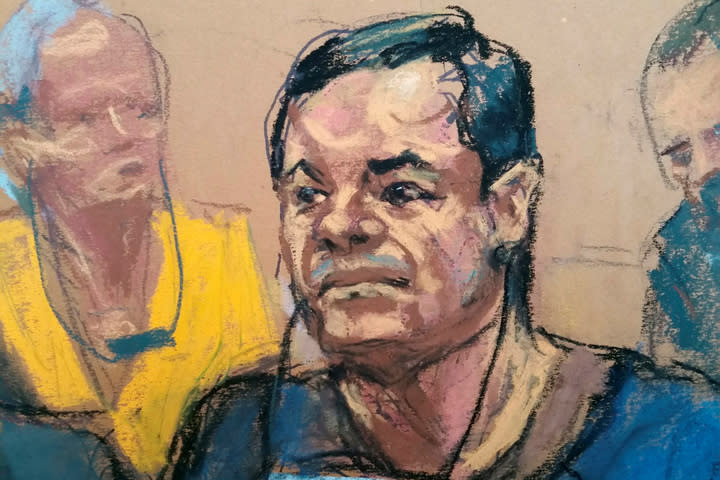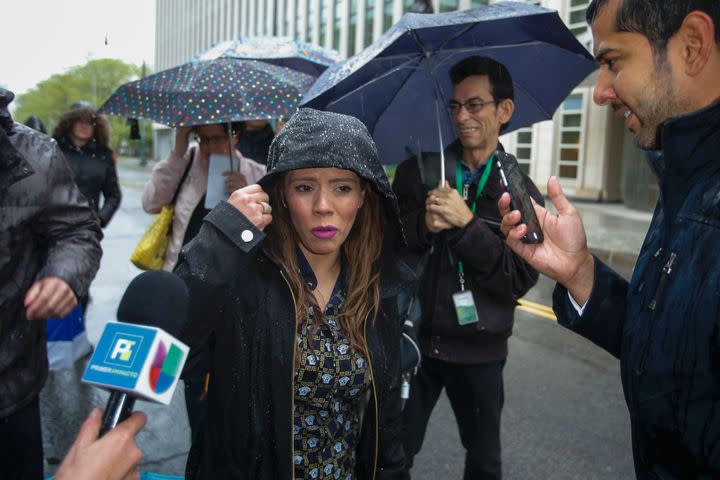Drug lord El Chapo has his day in court, and will be back for his trial — next year

Friday morning, Joaquin Guzman Loera was taken from his solitary confinement cell in lower Manhattan and escorted by a police motorcade across the Brooklyn Bridge to the federal courthouse in Brooklyn, where heavy security signaled the impending arrival of someone important.
Well before Guzman’s hearing began, reporters had already filled the courtroom’s press box and much of the overflow room across the hall, where a live feed of the proceedings played on two TVs and a large projector screen.
The main attraction was the sight of Guzman himself, the infamous Mexican drug lord known by his nickname, El Chapo (or Shorty), who eluded both Mexican and U.S. authorities for decades and, after being captured, escaped twice from maximum-security prisons in Mexico. But for Guzman, under tight detention measures that forbid him from receiving visitors other than his attorneys, Friday’s hearing was his first chance to chance to see his wife, Emma Coronel, in person, since his last court appearance in February.
For the majority of the hearing, Guzman faced away from the judge, leaning back in his chair as he scanned the crowd, his eyes darting between Coronel and Rosa Isela Guzman, the oldest of Guzman’s 18 children. Guzman listened through headphones as the interpreter sitting behind him translated the conversation among Judge Brian Cogan, the prosecutors and defense attorneys.
On Thursday, Cogan had denied a request by Guzman’s attorneys to allow Coronel, a former beauty pageant winner, to visit her husband in person or even talk to him over the phone. Instead he allowed the two to communicate via written messages subject to approval by law enforcement officials.
The family reunion was bittersweet and brief, as Cogan concluded Friday’s hearing by setting an aspirational trial date of April 16, 2018 — acknowledging the likelihood that it would be delayed even further.
Outside the courthouse reporters waiting in the rain to hear from Guzman’s attorneys were treated to an unexpected press conference by Guzman’s daughter and Jose Luis Gonzalez Meza, who identified himself as one of Guzman’s lawyers from Mexico.
Unlike Guzman’s court-appointed attorneys, the animated Gonzalez Meza referred to the cartel boss by his nickname, El Chapo, and ignored repeated pleas from reporters to answer questions in English.
Gonzalez Meza expressed outrage over what he suggested were tighter restrictions than those imposed on Nazis during the Nuremburg trials.
Even then, he said, Nazis “had lawyers and had direct contact with them.
During the hearing Cogan agreed that the current requirement that Guzman and his attorneys communicate and review evidence through a plexiglass window would make preparing for trial “cumbersome” if not impossible, and agreed to send a magistrate judge to visit the jail in person and explore alternative options.
Daughter Rosa Isela Guzman made only a few brief remarks in Spanish, mainly to thank her supporters. “I feel sad about what is happening,” said Guzman, who lives in Los Angeles and first revealed her relationship to the infamous drug lord in a controversial interview with the Guardian last year.
Guzman said her father’s incarceration is upsetting to all of her siblings, as well as her grandmother and aunts.
“We are all worried,” she said.

Still, she said she would prefer for her father to remain in the United States rather than be returned to Mexico, saying that she believed he was treated poorly in his home country.
Guzman confirmed at Friday’s hearing that he will continue to be represented by his court-appointed attorneys. Outside, one of his lawyers, Michelle Gelernt, defended Guzman’s right to a public defender despite his purported wealth.
“I think that as has been clear in the press, at this point he’s had no access to see if he has any assets at all or if there is anybody willing to pay for him to hire a lawyer,” said Gelernt. Though the U.S. government alleges that Guzman, as head of the powerful Sinaloa drug cartel, is worth billions, Gelernt said, “the government hasn’t shown that he has even a single dollar.”
Gelernt also said that, despite Cogan’s denial of their requests to alleviate some of Guzman’s restrictive prison conditions, his attorneys “will continue to fight for humane treatment for Mr. Guzman.”
“We think it’s widely accepted that solitary confinement has long lasting serious consequences, both mentally and physically,” she said, adding, “that’s true no matter who you are and what you’re accused of.”
The defense now has until May 26 to file a motion seeking documents related to Guzman’s extradition to the Eastern District of New York, which they suggest may have been done illegally.
“What’s clear to everybody is that the U.S. government petitioned for Mr. Guzman to be extradited to either the western district of Texas or the southern district of California,” she said. “As you can all see, we’re standing here in Brooklyn.”
Read more from Yahoo News:
Nearing trial, extradited drug lord El Chapo returns to court in Brooklyn
Trump’s newest executive order disappoints religious conservatives
Rep. Joe Kennedy on Obamacare repeal: ‘The fight is not over’
Trump, Ryan declare victory on Obamacare repeal — but its future is still uncertain
Photos: The Hindenburg: A look back – from first flight to blazing inferno



